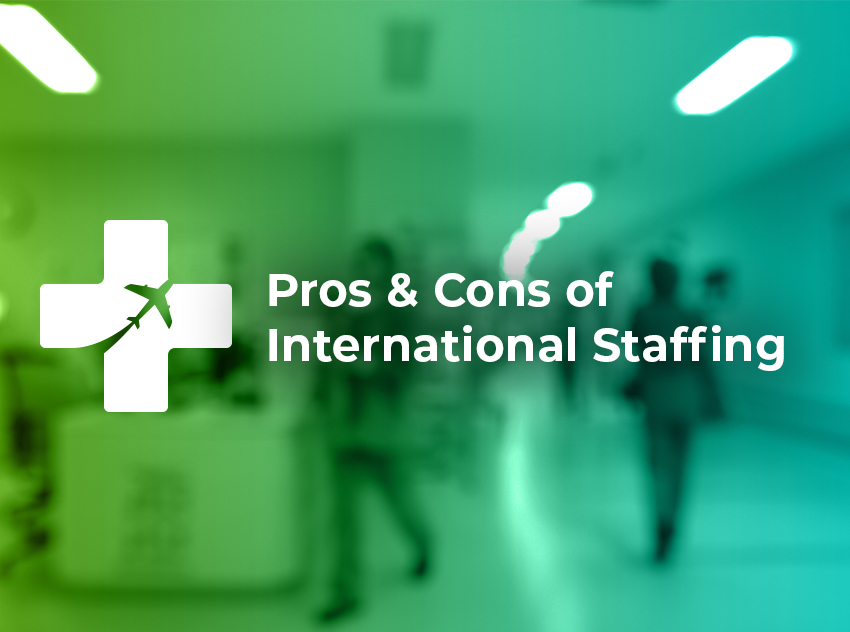
By Dillon Phillips
As healthcare providers across the country struggle to keep their facilities fully staffed, the need for quality clinicians is greater than ever before. To address these nursing shortages, many healthcare facilities and systems are exploring international healthcare staffing as an alternative to traditional methods to help close the gap.
This innovative approach to staffing leverages an international workforce to bring clinicians from abroad to fill domestic healthcare positions. However, much like other international business strategies, international staffing is not without its risks or possible drawbacks.
Pros of International Healthcare Staffing
Addresses Skill Shortages
The primary advantages of international nurse recruitment are the abilities to supplement existing talent pools and help fill critical skill gaps. Many regions and healthcare specialties face shortages of qualified professionals, particularly in rural or underserved areas. By recruiting internationally, healthcare facilities can access a larger selection of potential candidates, ensuring adequate staffing levels and quality care.
Adds Cultural Diversity and Global Perspectives
International nurse staffing brings a diverse range of cultural backgrounds, experiences, and perspectives to healthcare facilities. This type of diversity can help improve patient care, according to the American Association of Colleges of Nursing.
By fostering cross-cultural understanding, diverse staffs can enhance communication with different patient populations. Additionally, they can promote empathy, sensitivity, and the exchange of ideas and best practices from different healthcare systems across the world. Each of these benefits can improve the delivery of care.
Enhances Language Skills
Healthcare facilities that recruit international staff gain access to multilingual professionals. Language barriers can often impede effective communication with patients, leading to potential confusion and suboptimal care. International staff who are fluent in the language spoken by the local patient population can help bridge that gap. This ensures the accurate exchange of information, which can increase patient satisfaction and generate better patient outcomes.
Cost-Effective
In certain cases, international staffing can provide a cost-effective solution for healthcare facilities. Depending on the position, hiring foreign-educated healthcare professionals can be more affordable than training and educating their local counterparts. This is especially true for highly demanded or highly specialized roles. It also minimizes the need for overtime payments and temporary staff placements by adding full-time employees in positions that might otherwise go unfilled.
Cons of International Healthcare Staffing
Cultural and Language Challenges
Although cultural diversity can be beneficial, it can also present challenges within some healthcare settings. Despite their advantages, different communication styles, medical practices, and cultural norms can create misunderstandings or even conflicts among staff members. Language barriers especially can pose obstacles to effective teamwork, patient education and communication, and coordination of care.
Regulatory and Credentialing Hurdles
International staffing often involves navigating complex regulatory frameworks and credentialing processes. Healthcare professionals must meet specific licensing requirements and undergo extensive verification of their qualifications, which can be time-consuming and bureaucratic. Because processes and certifications vary from country to country, they can also lead to delays and extra work for hiring managers, healthcare facilities, and clinicians.
Workforce Integration and Retention
Transitioning into a new environment can be difficult personally and professionally, so retaining international staff can be even more challenging if staff members struggle to adjust. It is crucial for them to integrate successfully into their new workplaces. Otherwise, facilities may experience disruptions, turnover, suboptimal care, and other work-related issues.
Ethical Concerns
Foreign organizations hiring healthcare professionals from developing countries can raise ethical concerns. These countries may already have strained or underserved healthcare systems. Removing qualified healthcare workers from them can make it even more difficult for these countries to provide adequate care for their citizens. To mitigate these concerns, organizations should understand the global impact of international staffing and adhere to responsible recruitment practices.
When is international healthcare staffing the right strategy?
As we’ve discussed, international healthcare recruitment presents both benefits and challenges. Although global nursing solutions can help address skill shortages, promote cultural diversity, and improve language capabilities, they can also create cultural and communication challenges, regulatory hurdles, integration and retention issues, and ethical concerns.
Healthcare organizations must consider these advantages and disadvantages carefully before pursuing an international staffing strategy. They should review their own needs and resources, as well as the potential effects on their patients, staff, and global healthcare. After this review, if traditional staffing methods still cannot fill critical positions, the organization can begin to develop an ethical recruitment plan for international staffing.
If your organization is interested in an international talent acquisition strategy, please contact Medical Solutions or reach out to your account manager directly to learn more. Through our relationship with WorldWide HealthStaff Solutions, we can help provide clients with an expanded recruitment pipeline of experienced healthcare staff from around the world.